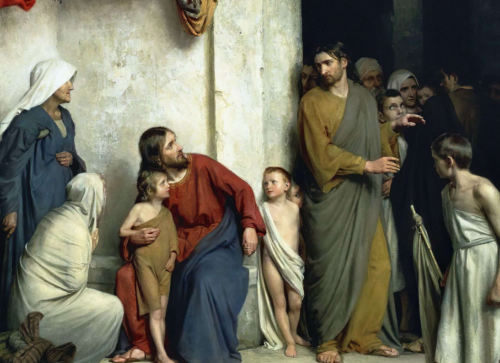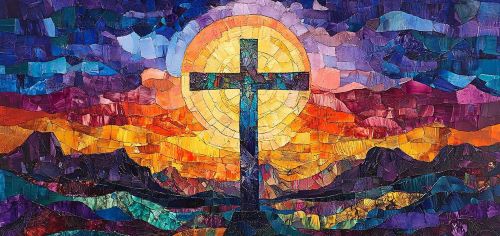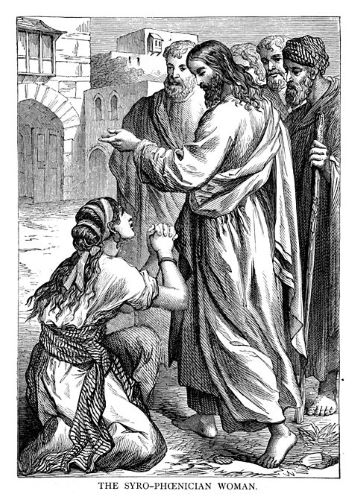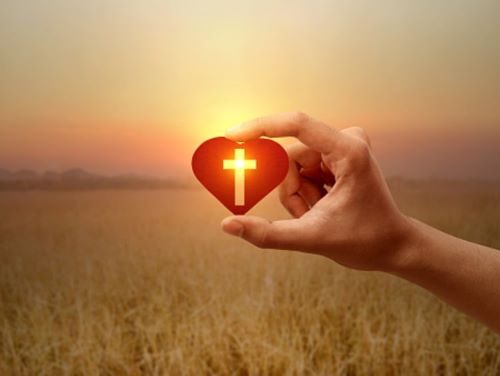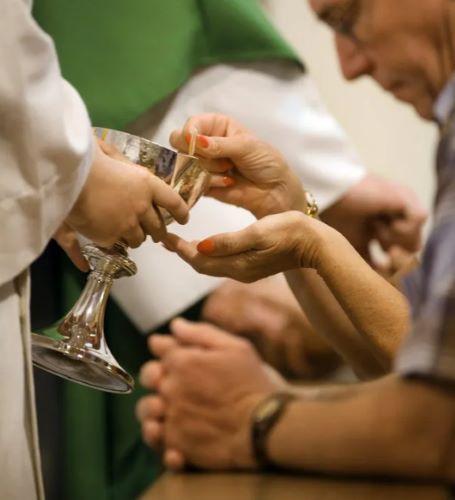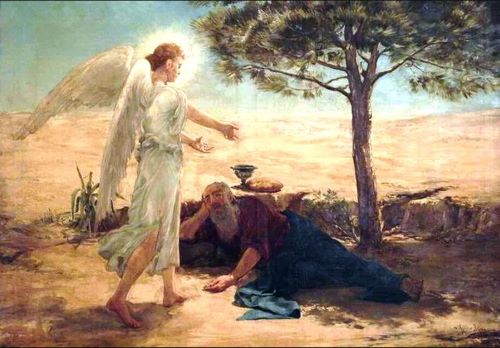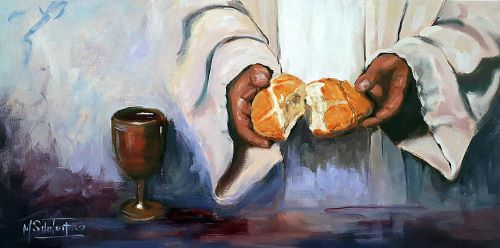A Convoluted Contradiction
Year A
Daniel 7:1-3,15-18
Psalm 149
2 Thessalonians 2:1-5, 13-17
Luke 20:27-38
May the words of my mouth O God… speak your truth…
Can God create a rock so heavy… that God could not lift it… this question is a convoluted contradiction about divine omnipotence… about being all-potent… because if God can create a rock that God cannot lift… then God is not omnipotent… and if God cannot create a rock so heavy that God cannot lift it… then God is likewise not omnipotent… so according to this particular question… omnipotence is self-contradictory… and God cannot be omnipotent… so in response to the question… can God create a rock so heavy that God could not lift it… the quick answer is No… but it’s more important to understand the explanation of why this is so… instead of knowing just the answer itself…
The question is based on a misunderstanding about what words like ‘almighty’ or ‘omnipotent’ mean… and they don’t mean that God can do anything… instead… they describe the amount of God’s power… and power is the ability to effect change… to make something happen… God has unlimited power… and the Bible affirms this in passages like Job Ch. 11:7-11 which establishes God’s limits as higher than Heaven… and deeper than Sheol… a measure longer than the earth… and broader than the sea… or in Ch. 37:23… which describes El Shaddai… God Almighty… as unattainable… great in power and justice… abundant in righteousness… and One who does not torment…
And so God can do whatever is possible to be done… but God cannot do that which is actually impossible… and that’s because true impossibility isn’t based on the amount of power one has… but is based on what is really possible… and since the truly impossible is not made possible by adding more power… impossibility means the same thing whether or not God is involved…
In fact… the Bible itself lists things God cannot do… like lie… or deny God’s own faithfulness… these things are not in God’s nature… and God cannot do… what is not actually possible to be done… like creating a two-sided triangle… or a married bachelor… just because words can be strung together in this way… doesn’t make the impossible possible…
Now what about that rock… a rock would have to be infinitely large to defeat an infinite amount of lifting power… but an infinite rock is a contradiction since material objects cannot be infinite… only God is infinite… there cannot be two infinites… so the underlying question itself… is really asking whether God can create a contradiction… and God cannot…
As we begin our seven-week Advent today… looking ahead with anticipation to the fulfillment of God’s plan each one of us… and for all of creation… looking ahead to why the Incarnation happened at all… we also briefly… look back in the week to All Saints’ Day and the reading from Daniel… as Pamela Cooper-White… Professor of Pastoral Theology at Columbia Theological Seminary in Decatur, GA reminds us… All Saints’ Day is a day to honor the priesthood of all believers… the saint-hood of all believers… this is emphatically not a day to venerate a select number of superstars of the faith… which was Church practice before the Reformation… but a time to recognize that all of us as Christians together… both the living and the departed… are saints of God… that Great Cloud of Witnesses referred to in Hebrews 12:1…
In our Jewish scripture reading… we become insiders… confidants to Daniel’s dream… which is full of apocalyptic images… eschatological images… and in our own time… our attention often moves from the huge to the insignificant and back… as our world turns… and our seas churn… we hear the great beat of monsters rising from our seas… from environmental concerns… to racism and white supremacy… to our political divisions… from things said to our therapists… or things we can barely say to ourselves… yet we can ask these monsters what it would take to quiet and soothe them… and we can ask God for open ears and hearts… to hear their replies…
And so Jesus is asked a question by the Sadducees… members of a Jewish sect… who denied the resurrection of the dead… the existence of spirits… and the practice of an oral tradition… but who emphasized acceptance of the written Law alone… now we ought not make blanket assumptions about every Sadducee… Pharisee… or any of the various Jewish religious and political groups… but they were… as John Shea writes… by and large not Jesus’ friends… not companions sitting around a campfire who entertained themselves with trivial banter… they were people of significant political and religious influence who were skeptical and concerned about Jesus’ provocative ministry… and considering their line of questioning… we might be wary of their underlying intentions…
And we might be reminded… that at that time… belief in a resurrection of the dead was a relatively new feature within Judaism… only several hundred years old… the Sadducees were traditionalists… confining themselves to the books that Moses wrote and admitting to little else… but although they had a rationale… it was based in some fallacious assumptions… one reason they couldn’t accept the resurrection of the dead… was because it couldn’t accommodate the command about Levirate marriage which was described in Deuteronomy 25:5-10… that is… the obligation of a man to marry his sister-in-law… should his brother die… so that his brother’s lineage could continue on… and the reason they couldn’t accept that… was because it would lead to polyandry… the practice of one woman having more than one husband…
But even further… because of Mosaic purity laws… they asked… perhaps flippantly… So when the dead are raised… must they too follow purity laws… must they be sprinkled… since they have been in contact with a dead body… namely their own… but an even more subtle part of their argument raises issues of materialism… since in the resurrection of the dead… they saw people as being forced to return to this space-time continuum… and being subject once more to the laws that are in effect here… and from which they had been freed in their trans-temporal realm… and in some ways… their line of questioning is like the one with which I began this sermon… their assumptions are wrongheaded… the question itself is really asking whether God can create a contradiction… and needs to be unpacked…
The underlying premise of Levirate marriage… the underlying motivation… was the threat of extinction… and marriage equaled procreation… the continuance of the clan was an overriding value… and we must also consider how harsh life was then… and what the level of infant mortality must have been… but since resurrected people won’t die… in the age to come… marrying and being given in marriage won’t be required…
But what about those who had already died… when Moses turned aside to investigate the bush that didn’t burn up… YHWH was identified as… the God of your father… the God of Abraham… the God of Isaac… and the God of Jacob… and when God said this… those patriarchs were already dead… . but we know that God is a God of the living and not of the dead… so the unavoidable conclusion is that they are alive in God… that they are living in God… even though they have left the earth… and as John Shea writes… Jesus… the beloved Son… knows that God always is… and those who are of God… always are… and this is what… resurrection of the dead… means…
We are saints… but that doesn’t mean that we’ve become so holy that we can’t squeeze in any more holiness… it’s not because every decision we make is perfectly made… or because every word we utter is perfectly chosen… we are saints because as 1John 4:19 says… God loved us first… we are saints… because… we are saved by grace through faith…
We are saints… because… when we consider the chaos that Daniel described… and look at the chaos swirling around us now… we know in our bones… deep in our bones… our need for Jesus… and all of the Wisdom he embodied… and true eschatology begins in the moment when we not only understand that… but perhaps even speak it out loud…

